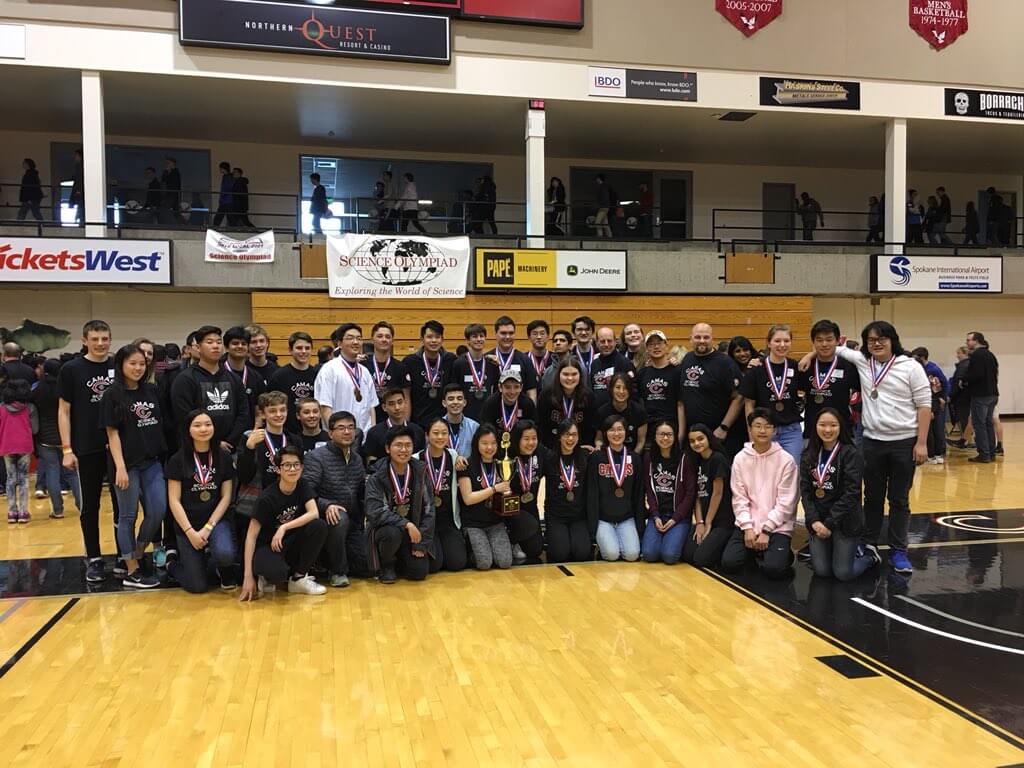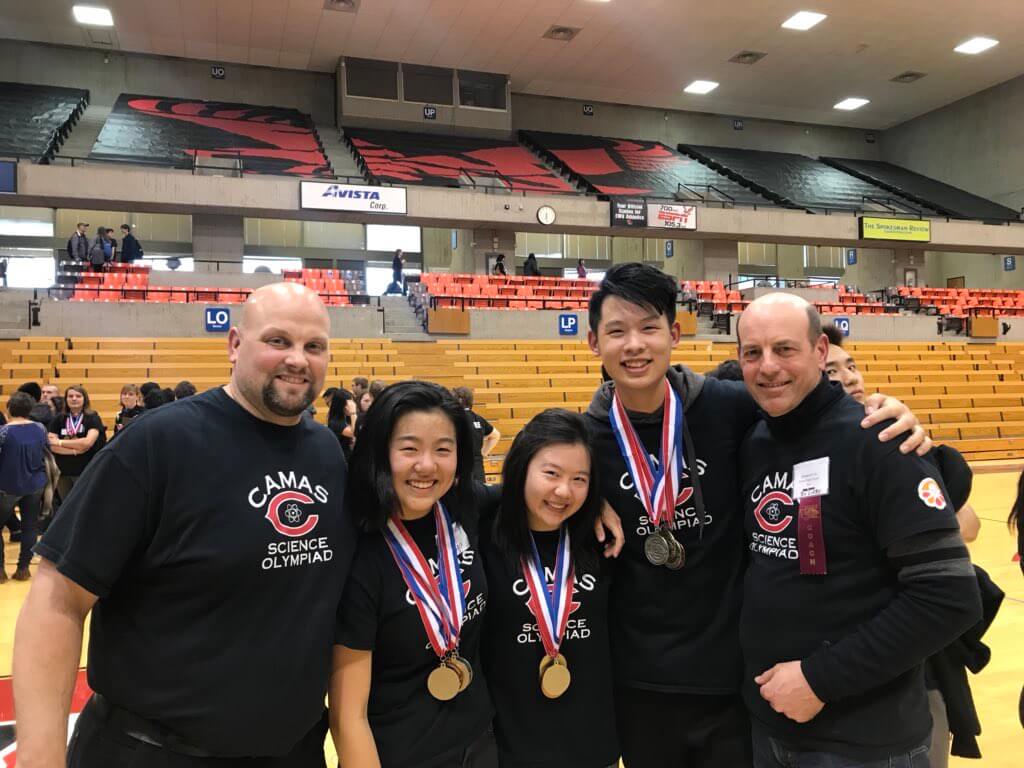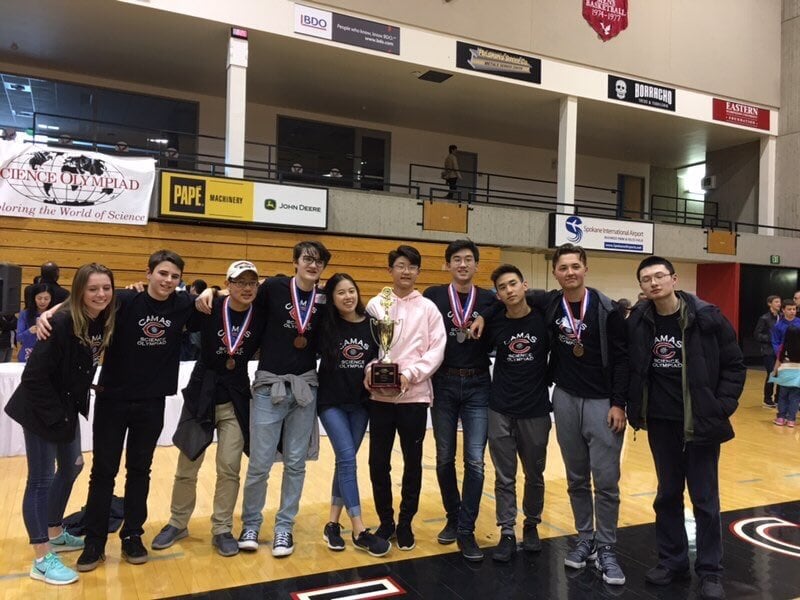Approximately 600 adults attended a #SAVETHEKIDS parent education event Tuesday night in Vancouver featuring Instagram Influencer/Youth Advocate Collin Kartchner and Educator Katey McPherson.
“This has been a year in the making,” said one of the event’s organizers, Greg Gillespie, who introduced all of the local volunteers. “I’ve been following him on Instagram, and Collin started off making fun of social media influencers, but when Hurricane Harvey hit in Texas he realized he could do things that make a difference. They helped big time in Houston. Has helped out with many causes. Then he really started this crusade about helping kids and parents navigate screens, and now he visits schools and communities all over the country. He even has a TEDX talk.”
Kartchner spent Tuesday at Liberty Middle School and Hood River Elementary, and encouraged guests to evaluate individual phone and screen usage.
“First, none of us had any clue we’d be dealing with this when we had our children,” said Kartchner. “We are the first generation of parents figuring this out, and we have to talk to each other, and I want you to understand this is a no-shame evening.”
He showed a video that of three people from three generations, the first two of which discussed a childhood outdoors, close to nature.
“The current generation is obsessed with video games and using their smart phones and tablets,” he said. “So, what if this trend continues? Nature has always been a part of childhood, and we need to keep it that way. Society has changed and we’ve created new systems and tech and now can tell it’s harming our kids. Our kids are creative geniuses if we let them.”
He shared a story about Whitney, a 20-year-old in Utah who committed suicide because of the pain she suffered using her smart phone.
“So, we created a program called #savethekids and as parents we have to lead the way,” he said. “When we have our phones out in front of our kids it means we appreciate the phone more than we appreciate them.”
Citing examples of new baby and toddler toys that incorporate smart phone technology he said “we have traded all this amazing stuff and have converted it all to a digital screen and we’re realizing it’s been a mistake. Inmates get more outdoor time than our children do.”
And, the older generations are doing it, too.
“Parents: this is not a phone, this is a mini-super computer with access to everything,” said Kartchner. “We are handing them loaded weapons and if we don’t teach them they will destroy themselves. You have to parent your kids, you have know what they’re getting into. If you give them a smartphone you’re giving them a ticket to do anything.”
Video: Sobering Statistics
Then he showed the audience sobering statistics (click video link): https://youtu.be/OzdMG9ovQWs
“Parents, we have to intervene,” he said. “We have created a society for our children that is extremely stressful. We can stop ‘still facing’ our kids and their problems. Babies are very responsive to the world around them. Infants really do engage in personal interaction.”
Video: ”Still Facing”
He used this video to show his point (click video link): https://youtu.be/-Qh5CyLBlkQ
Using images of the pre-frontal cortex slide, Kartchner explained how the brain develops from the rear to the front.
“The pre-frontal cortex, which is the last part of the brain to develop, affects decision making,” he explained. “Your kid isn’t even close to full development. Social media and gaming have negative effects on our children’s brains. Games are more addictive than cocaine. Fortnite, a company that makes $1.8 billion a quarter off a ‘free’ game is also an attraction for sexual predators. We are letting our kids turn their backs on their talents.”
Social Media App Ratings
“Social media app ratings are misleading,” he said. “We’re trying to help the tech companies change how the way apps are rated. For example, lots of porn links are sent through Instagram. Watch out for private DMs. It’s too much for our kids. These phones are destroying our kids. Instagram is a dangerous place for our kids. SnapChat is the worst. They throw out articles to our kids encouraging porn, and 82 percent of porn on Pornhub encourages violence. We have to be careful. TikTok is the next big one and is a place for predators.”
SnapChat is the worst!”
— Collin Kartchner

“Mom, I Got Bit”
When you hand your kids a snake they’re gonna get bit, and that’s why he will soon be releasing a book called “Mom, I Got Bit.” He likened the dangers of smartphones to having a snake, and explained how to react when your children get bit:
- Don’t yell, don’t get mad.
- Tell them “I love you, thank you for being brave enough to tell me you got bit.”
- Offer assistance: “What can we do to help you?”
- Create a “no trouble” bubble, which is a safe place.
Hugs and Signs You Might Be a Lawnmower Parent
“Hugs! Our kids need more of this than ever before,” he said. “Hug your kids — kids need 8 hugs a day for 8 seconds each. 20 second hugs have proven to boost the immune system. Why are they so desperate to be seen and loved?”
In this video, he explained what it means to be a “Lawnmower Parent” (click video link): https://youtu.be/8Q_53e283rA
Katey’s Presentation
“Technology is part of our life but it cannot be our central focus,” she said. “When you hand over your device you’re giving them a medium to share their feelings … Prior to age 2 you’ve taken about 2,000 photos. It teaches them that life is to not be lived, it is to be documented.”
“After Columbine (the school shooting) in 1999 we decided nobody would harm our kids. We’ve taken away from our children the ability to cope with their own pain. Our students are walking around with a thin veil of terror and the device is not going to save their lives.”
Citing increasing national anxiety trends, McPherson said that students need to know they have dignity.
“Students need to know they have dignity,” she said. “Think about adding this to your daily vocabulary.
This generation is over the word ‘respect.’ The reason is because we’ve taken away their dignity all day long. We bring them to this Earth with inherent worth, and we need to stop doing the heavy lifting for them. If we want to stop school shootings we better start with the inside out.”
“Spend your energy on being clear on access and sit down with your family to discuss what’s fair. Sit down and be really clear about what the boundaries are. Create a family data contract. They’re not allowed to share private information. Don’t share inappropriate photos. It has to be an ongoing and pervasive message. This is a parent issue, not a school issue. The goal is self-governance by 17 or 18. It is not easy work, but it is possible. If you stop dancing you will lose your child to pornography or gaming or suicide. It’s time to really step into this. We are here to get you in the know about what our kids are exposed to.”
The next #savethekids event happens Wednesday, October 16 from 7-8:30 pm at Mannahouse in Vancouver.























